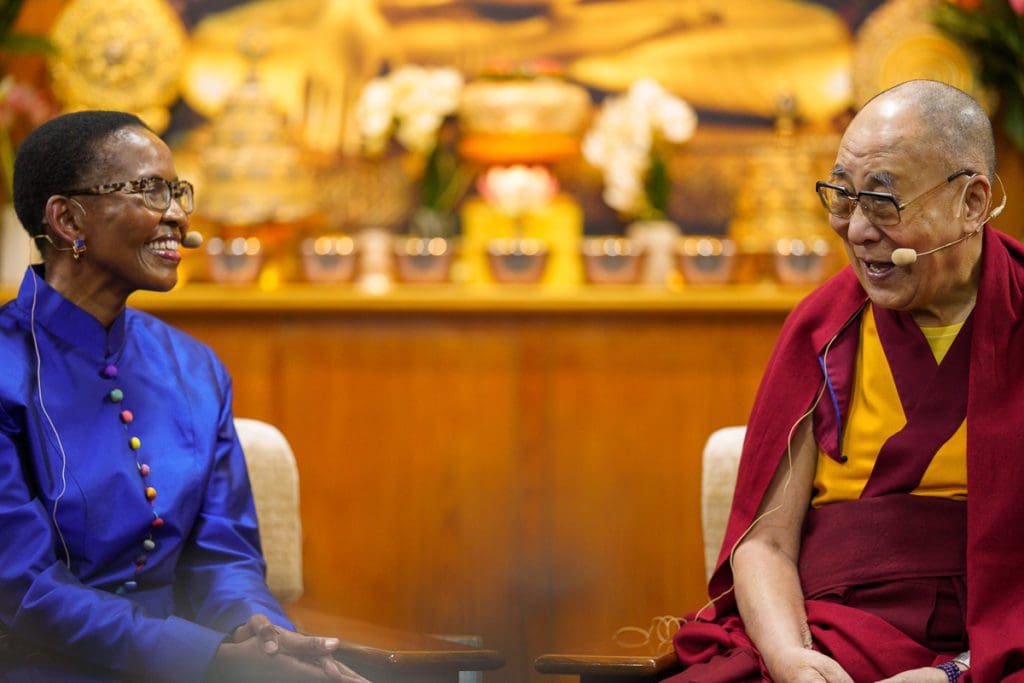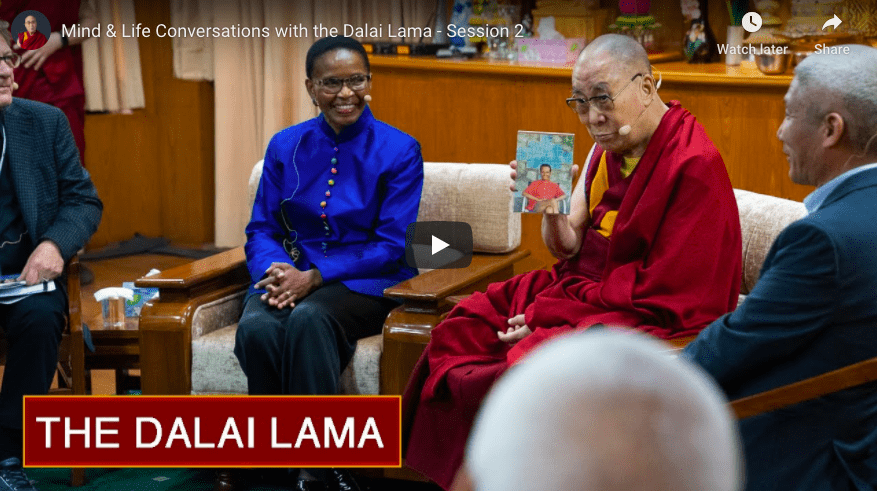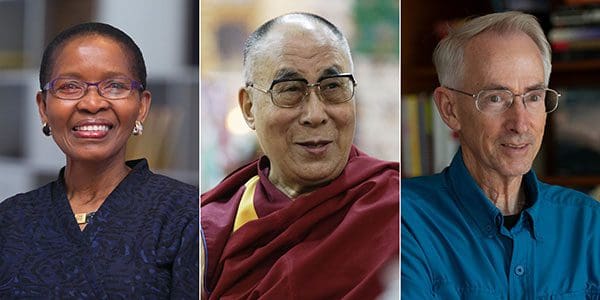
This is the first of two blog posts describing recent Mind & Life Conversations with the Dalai Lama and prominent thought leaders on the topic of “Compassion, Interconnection, and Transformation.” Photos by Phil Walker and Tenzin Choejor.
Clinical psychologist and social scientist Pumla Gobodo-Madikizela traveled thousands of miles from the southernmost tip of Africa to northern India for a conversation with the Dalai Lama that spanned both the hatred and brutality of which humans are capable and the conditions that make individual and societal transformation possible.
Sponsored by the Mind & Life Institute, their conversation on the theme of “Compassion, Interconnection, and Transformation” bridged African wisdom, science, and spiritual traditions to reveal common ground and actionable insights. In attendance were some 50 invited guests—with tens of thousands joining online from around the globe.
The Dalai Lama welcomed Gobodo-Madikizela from the “great continent” of Africa, while acknowledging its history of exploitation by colonial powers. She, in turn, offered well wishes from her friend and former colleague Archbishop Desmond Tutu, with whom she served on South Africa’s Truth and Reconciliation Commission. Through these brief moments of connection, the stage was set for a profound and meaningful dialogue.
Gobodo-Madikizela, Research Chair in Historical Trauma and Transformation at Stellenbosch University, has spent years exploring the psychological impact of mass trauma and violence, and the conditions that allow for forgiveness and healing. She began by introducing the African philosophy of ubuntu that laid the groundwork for healing in the aftermath of apartheid in South Africa. Ubuntu conveys the idea that “a person becomes a human being through other people,” she said. “It was part of the work of the Truth and Reconciliation Commission that we be guided by the principle of interconnectedness, setting aside… vengeance and looking to the possibility that we can connect as human beings.”
To illustrate the concept of ubuntu, Gobodo-Madikizela shared a story. She described how, during the reconciliation process, a group of mothers were brought face-to-face with a young man who had collaborated with the apartheid police in the murder of their children. At first, the women were overcome with anger—and then, something shifted. The man, who came seeking forgiveness, turned to the women and addressed them as “my parents,” evoking their sense of parental responsibility. At that moment, one of the mother’s responded, “My son. You are the same age as my son.”
From that point on, the women began to relate to the young man as they would to their own children. Embedded in the concept of ubuntu is “the possibility that you can transcend yourself even if you’re wounded, you’re hurt, or carrying trauma,” said Gobodo-Madikizela, who refers to such moments as the “emergence of the unexpected.”
Embedded in the concept of ubuntu is “the possibility
that you can transcend yourself even if you’re wounded,
you’re hurt, or carrying trauma.”
— Pumla Gobodo-Madikizela
Gobodo-Madikizela’s research focuses, in part, on the role of the body in such healing processes. She recounted how, in interviews with the mothers, they described a physical sensation they experienced—behind the navel—through which they connected to the young man’s mother and her feelings for her child. The women referred to the sensation as inimba, a Xhosa word that loosely translated means umbilical cord. But its meaning goes far deeper, encompassing a person-to-person connection and deeply shared experience.
While such profoundly transformative experiences pave the way for forgiveness, Gobodo-Madikizela uses the term ‘repair’ to describe the long-term process of healing both individuals and communities. Repair refers to the moment-by-moment, day-to-day act of extending warm-heartedness to others in the face of the pain “that is always in the world,” she explained. It’s about being caring and consciously doing good.
She also spoke to the power of creating spaces where stories and experiences can be shared. The power of the Truth and Reconciliation Commission was creating the space for “witnessing others and seeing what was possible,” she said. “When we witness [the] stories of others… there’s always the possibility we might be touched by them,” she added. “That’s what ubuntu means… the reciprocal witnessing of the other, that creates the sense of community.”
In the face of structures and systems that reinforce deep divides in today’s world, moderator and Mind & Life Board Member Aaron Stern asked how the concept of ubuntu and Buddhist teachings can be applied in response to global problems.
To Stern’s point, the Dalai Lama underscored the growing interconnectedness of our world as a result of technology, the global economy, and the threat of climate change. “Many of the challenges we face are collective challenges,” he said. “If the rest of the humanity is suffering, there simply is not the possibility that one person as an individual can enjoy and experience happiness.”
He added that, according to Buddhist teachings, “if an individual chooses to focus only on his or her own interests, then it leads to more misery and suffering; but if the individual shifts the focus and takes concern about others’ well-being… then that opens the door to happiness.”
Also important is cultivating wisdom and the ability to regulate and deal with strong emotions, emphasized the Dalai Lama. “Many of the emotions that cause us problems, like strong attachment or hatred… are actually built on a very false perception of reality,” he said, underscoring the need to nurture positive qualities like lovingkindness, compassion, empathy, and concern for others.
“If an individual chooses to focus only on his or her own interests,
then it leads to more misery and suffering; but if the individual
shifts the focus and takes concern about others’ well-being…
then that opens the door to happiness.”— The Dalai Lama
When it comes to the role of systems, discussion facilitator Richie Davidson, Professor of Psychology and Psychiatry at the University of Wisconsin-Madison, reinforced the potential for change that lies in education. “Corruption is learned,” he said in response to concerns about the lack of moral leadership within many nations today. “It is not something that is in our nature… If we focus on younger people, who by nature are not corrupt, if we can nurture those positive qualities they come into the world with, we have a chance of minimizing the likelihood of subsequent corruption.”
Gobodo-Madikizela offered a very real example of how education systems can help facilitate transformation. She described how Stellenbosch University has created a Transformation Office dedicated to upholding the values of human dignity, social justice, freedom, and equality. The office is charged with creating spaces “so that people can engage with one another, experience one another… and reach out and connect [to others] even though apartheid has divided us,” she shared.
The Dalai Lama, who has written extensively on the importance of “educating the heart,” elaborated on the critical role of education in overcoming deep divides in today’s world. “Modern attention is very much oriented around material value,” he said. “From kindergarten, we should teach the ‘hygiene of emotion,’” helping young people to distinguish harmful emotions.
As the conversation drew to a close, Gobodo-Madikizela returned to the concept of repair and the need to commit to an “ethical humanity” that takes into consideration not only the present but future generations as well. “To repair is to engage every day,” she said, “to be mindful constantly that there is suffering out there, and that there is work to do.” This compassion toward others establishes the foundation for transformation within ourselves and our communities.
To learn more, watch the Mind & Life Conversation between the Dalai Lama and Pumla Gobodo-Madikizela.












